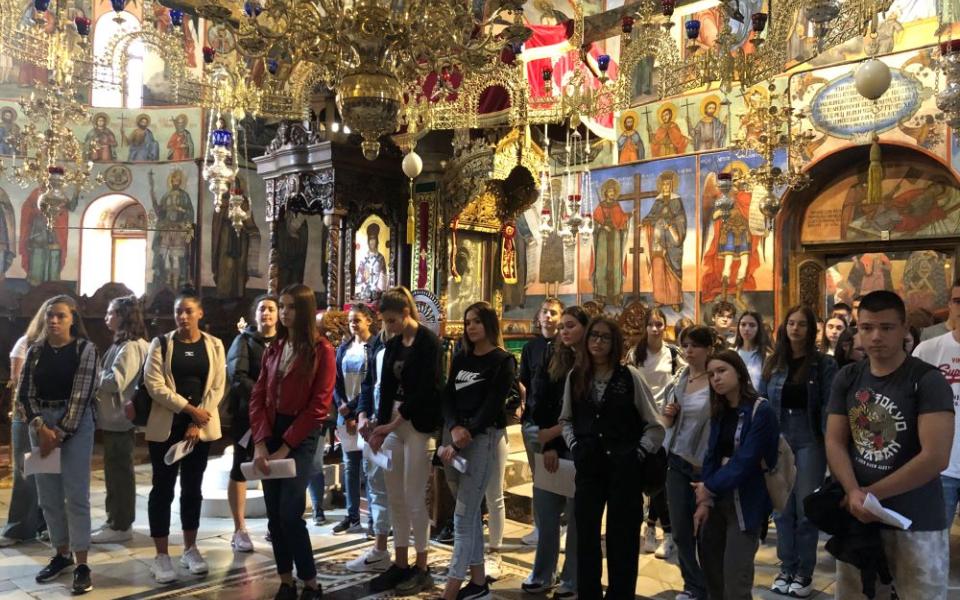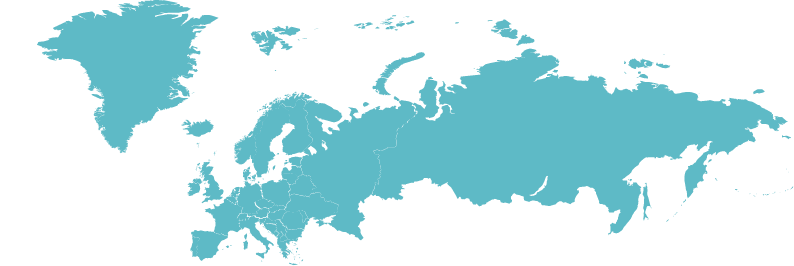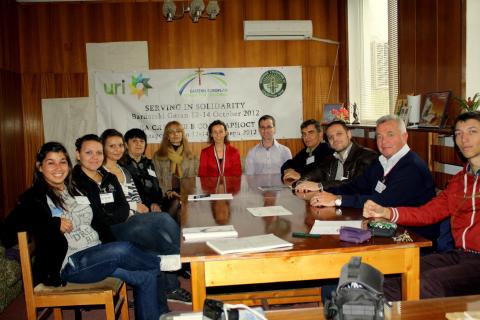
Bridges Cooperation Circle in Europe marked the International Day of Peace with special training offered to young people. The main focus of the training was on the holocaust.
On September 21, BRIDGES CC celebrated The International Day of Peace with a one-day training, in which students and teachers from"St. Kliment Ohridski" school in Plovdiv took an active part. The initiative was implemented with the financial support of the Olga Lengyel Institute (TOLI) TOLI - The Olga Lengyel Institute for Holocaust Studies and Human Rights.
With a group of 40 children (16-17 years old) from the 10th, 11th, and 12th grades (from different religious backgrounds), accompanied by their teachers Mrs. Maria Konstantinova, Mrs. Nikolinka Abrasheva and Mrs. Yulia Kireva, we visited the Bachkovo Monastery "Assumption" and the Synagogue "Zion".

Petar Gramatikov, member of the Board of BRIDGES, chief expert on religious issues for the Plovdiv Municipality, and former URI Europe Global trustee, introduced the young people to the structure of the Orthodox Church in a fascinating and vivid way, drew attention to the contribution of the Bulgarian hierarchs and the entire Bulgarian people for the rescue of the Bulgarian Jews. We bowed in front of the graves of two "Righteous of the Jewish people" - hierarchs of the Bulgarian Church - Exarch Stefan and Patriarch Kirill, located in the church of the monastery. Petar Gramatikov paid special attention to the topic of the Holocaust, which was also the main focus of our training.
Bishop Sioninii, abbot of the Bachkovo monastery, despite not being able to meet us in person due to a commitment in the Troyan monastery, welcomed us as special guests and allowed us to enter and look at the old refectory, covered with frescoes from the beginning of the 17th century. And to make us feel at home, he had prepared a welcome treat for us in the new dining room of the monastery.

We then headed back to Plovdiv and the Zion Jewish Synagogue, where we were received and warmly welcomed by Mr. Albert Behar.
Here, in addition to the structure of the synagogue and the peculiarities of the Jewish diaspora and holidays, we had time to pay special attention to the topic of the Holocaust.
Apart from the expert Petar Gramatikov, students also took part. The two girls, Ivayla Haikova and Lili Alexova, from the 11th grade, had prepared with great care on the topic and introduced the group to the Holocaust and the role of Bulgaria in saving the Bulgarian Jews.

We ended the day by handing out certificates for active participation in the training and mutual desire for further meetings.
Teaching tolerance and empathy is an important part of non-formal education and has been shown to improve emotional intelligence, especially in young people.

We thank the management of "St. Kliment Ohridski" school or the partnership and the teaching staff who shared this day with us.
------------------------
Bachkovo Monastery (in ancient times "Petritsonski") - Known for the combination of the traditions of the Byzantine, Georgian and Bulgarian cultures; the second largest Orthodox stauropygial monastery of the Bulgarian Orthodox Church
The "Assumption" monastery of Bachkovo was founded in 1083 by the Byzantine military commander of Georgian origin, a domestic of the Byzantine emperor Grigory Bakurian and his brother Abbasiy. The monastery is one of the most visited places in Bulgaria, an important tourist center and is included in the list of the Hundred National Treasures of Bulgaria.
------------------------
The topic of the Holocaust and the rescue of Bulgarian Jews and Gypsies After intensifying the policy against Gypsies and Jews, the German government also demanded that Bulgaria hand over its Jews and Gypsies and deport them to the "death camps". Tsar Boris III refused, thus saving the lives of around 170,000 Roma and 50,000 Jews. The Nazis themselves characterized the Bulgarians as completely misunderstanding the essence of the Jewish question, as evidenced by archival German diplomatic documents.
"No one can convince the Bulgarians to hate the Jews" - these are the words of the German ambassador Beckerle in Sofia during the last attempt of the German authorities to organize the deportation of the Bulgarian Jews to the death camps.

